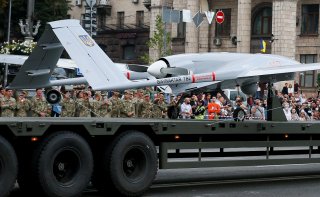Ukraine’s Recent Drone Strike Reignites Tensions in Donbass
Russia says the use of Turkish drones near the Line of Contact is a violation of the Minsk Agreement, but Ukraine begs to differ.
Ukraine’s purchase and deployment of Turkish combat drones has reignited the territorial conflict simmering its eastern border, with some warning of the likelihood of further escalation.
Kiev is moving forward with plans to procure dozens of Turkish-made Bayraktar TB2 unmanned combat aerial vehicles (UCAVs). The acquisition is part of a larger defense cooperation venture with Ankara involving the production of Bayraktar drones on Ukrainian soil.
It was revealed earlier this week that a Ukrainian Bayraktar drone destroyed a separatist artillery piece in the Donbass region during its first combat mission. Rodion Miroshnik, a representative of the self-proclaimed Lugansk People’s Republic (LPR), accused Kiev of violating the Minsk Agreements: “In September 2014, Kiev signed a memorandum envisaging a straightforward ban on flights of combat aviation and foreign unmanned aerial vehicles (UAVs). But [Ukrainian Armed Forces Commander Valery] Zaluzhny is reporting flights and even combat use of UAVs along the line of contact. Therefore, he just does not give a damn about Kiev’s obligations under the Minsk Agreements.” Miroshnik’s contentions were echoed by Germany’s Foreign Office, which noted in a statement that Berlin was “very concerned” about the drone strike and that the Minsk accords authorize drones to be used only by the OSCE mission.
But Ukrainian officials say the strike was not conducted in violation of the Minsk Agreements because the drone allegedly did not cross the officially-delineated “Line of Contact” between government and separatist forces. Oleksiy Arestovych, speaker of the Ukrainian delegation to the Trilateral Contact Group (TCG) for the resolution of the Donbass conflict, insisted that the “use of domestic [Ukrainian] drones is not forbidden under the Minsk Agreements.” Ukrainian foreign minister Dmytro Kuleba added at a press conference that “Ukraine has not violated anything,” arguing instead that the separatists had no legal right to deploy the destroyed artillery piece so close to the Line of Contact.
The strike prompted a wave of alarm in Moscow. “I would like to mention once again that the conflict in southeastern Ukraine has no military solution, as was acknowledged by all those countries that so much fret over civilians and, generally, the situation in Ukraine. The attempts to settle it by force will have very deplorable and somewhat incalculable but generally tragic consequences,” said Russia’s Foreign Ministry Spokeswoman Maria Zakharova. Some prominent Russian commentators went further. “Kiev is playing an exceedingly dangerous game,” said popular TV anchor and talk show host Vladimir Soloviev during the Friday edition of his nightly broadcast on Russian television. “They are provoking the [Donetsk and Lugansk] Republics into taking retaliatory measures, which means a major war. Under these circumstances, Moscow will be confronted with a serious choice. But I don’t see any choice at all. We have the Russian President’s statement that we all remember: any sudden moves on their [Kiev’s] part will put their statehood into question.” Soloviev is likely referring to Putin’s June 2018 statement that Kiev’s alleged military “provocations” against the Donbass separatists will “have grave consequences for Ukrainian statehood as a whole.”
Ukraine’s Bayraktar deployment comes shortly on the heels of Defense Secretary Lloyd Austin’s visit to Kiev earlier this month. “I would just point out, no third country has a veto over NATO’s membership decisions,” replied Austin when asked by a Ukrainian journalist about Russia’s opposition to Ukraine’s NATO aspirations. “Ukraine has a right to decide its own future foreign policy, and we expect that they will be able to do that without any outside interference.”
Austin’s remarks drew a swift rebuke from the Kremlin. “We noted the aggressive Russophobic tone of the statements made by the head of the Pentagon, who directly supported the revanchist sentiments of Kiev’s party of war,” said Zakharova. “Not only does this provoke tensions along the contact line in Donbass, it also raises serious questions regarding Washington’s adherence to its own statements of readiness to facilitate the implementation of the Minsk Agreements.” Despite their off-the-cuff nature—and the lack of corroborating statements or policies from the Biden administration—Austin’s comments did little to allay the longstanding fear of some in Moscow that White House is quietly paving the way for Ukraine’s gradual accession to NATO.
There are some early signs that the Kremlin’s reaction to these perceived “provocations” could extend beyond harsh words. According to eyewitness accounts posted on social media, Russia’s Armed Forces are coordinating large-scale westward equipment transfers—including T-80U tanks, 2S19 Msta howitzers, short-range missile systems, infantry fighting vehicles (IFV’s), and logistical vehicles—in the direction of Ukraine. Michael Kofman, Director of Russia Studies at Center for Naval Analyses and Senior Adjunct Fellow at the Center for a New American Security (CNAS), drew attention to these reported movements. “I’d watch the military situation around Ukraine more closely. Things are moving. It doesn’t feel like what happened in March-April,” he tweeted, referring to the massive buildup and subsequent dispersal of Russian forces on Ukraine’s eastern border earlier this year. “The point of my comment about Ukraine is that I think there is a developing situation, and it could turn into something significant. Yes, in the winter (like 2015). Not in the next few days, but weeks/months. Overall, I don’t think you’re seeing a drill or regular training,” Kofman added.
Mark Episkopos is a national security reporter for the National Interest.
Image: Reuters

